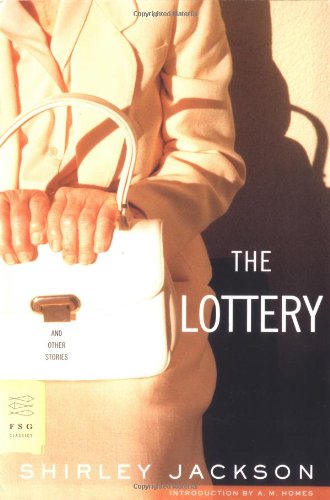All Nonfiction
- Bullying
- Books
- Academic
- Author Interviews
- Celebrity interviews
- College Articles
- College Essays
- Educator of the Year
- Heroes
- Interviews
- Memoir
- Personal Experience
- Sports
- Travel & Culture
All Opinions
- Bullying
- Current Events / Politics
- Discrimination
- Drugs / Alcohol / Smoking
- Entertainment / Celebrities
- Environment
- Love / Relationships
- Movies / Music / TV
- Pop Culture / Trends
- School / College
- Social Issues / Civics
- Spirituality / Religion
- Sports / Hobbies
All Hot Topics
- Bullying
- Community Service
- Environment
- Health
- Letters to the Editor
- Pride & Prejudice
- What Matters
- Back
Summer Guide
- Program Links
- Program Reviews
- Back
College Guide
- College Links
- College Reviews
- College Essays
- College Articles
- Back
The Lottery by Shirley Jackson
“Am I walking towards something I should be running away from?” once asked Shirley Jackson ("Shirley Jackson Quotes"). In her short story, “The Lottery” all of the characters come together to participate in this “lottery.” Only it is not what most people would think. These characters should really being running away instead of coming together. In the end, one of them does end up running, but does not get too far. Everyone including her own family stones her death as a way to keep the population under control. It is a tradition that they have kept since before anyone can remember. Using Marxist criticism, a reader can analyze Shirley Jackson’s, “The Lottery” by using the aspect of positions of power.
First, the more powerful characters have an effect upon the other characters that appear in this story. Mr. Summers had, “time and energy to devote to civic activities” (Jackson). He had a successful business, so he didn’t have to do much work and had time to do other things such as organize the village. This even got him into the position of being the conductor of the lottery. Before the lottery could start, “Mr. Summers and Mr. Graves made up the slips of paper and put them in the box, and it was taken to the safe of Mr. Summers’ coal company and locked up until Mr. Summers was ready to take it to the square next morning” (Jackson). The box was mainly kept in the hands of Mr. Summers. He had to make many of the decisions that went along with the lottery. Some of these being how many people were chosen to be stoned, how many pieces of paper had the black spot on them, and how they were distributed. Since the original ways of running the lottery were lost throughout the years, someone had to make the new rules.
Last, the lack of power held by the villagers had an effect on the events of this short story. The villagers knew exactly what to do when it came time for the lottery. They “began to gather in the square, between the post office and bank, around ten o’clock” (Jackson). They knew exactly where and when to be. It gives the story a controlled feeling as if everyone knew their purpose. At the time of lottery, “”It isn’t fair, it isn’t right,” Mrs. Hutchinson screamed, and then they were upon her” (Jackson). No one had a say in anything. They drew pieces of paper and the person to hold the marked paper was stoned. Everyone had grown accustomed to these ways. It was looked upon as if someone had to be killed, so the population did not grow to be too big. Even if someone didn’t agree with this, they didn’t have the power to change the ways of the ritual.
In conclusion, Shirley Jackson’s, “The Lottery” can be analyzed using Marxist criticism through the aspect of the positions of power. This short story shows how certain governments and groups of people live and organize their communities. Some people don’t get a say in why they should live and not have to be stoned or die from any other ritual. They choose those that have the least importance or have done something wrong and get rid of them in. It gives citizens of countries like the United States to see how lucky we are to be able to live such free lives. Some rules might be unfair, but many other areas around the world have it much worse.
?
Works Cited
Jackson, S. (1948). The Lottery. New York: The New Yorker.
"Shirley Jackson Quotes" Share Book Recommendations With Your Friends, Join Book Clubs,
Answer Trivia. 2011. 13 Apr. 2011.
<http://www.goodreads.com/author/quotes/13388.Shirley_Jackson>.
Similar Articles
JOIN THE DISCUSSION
This article has 0 comments.

